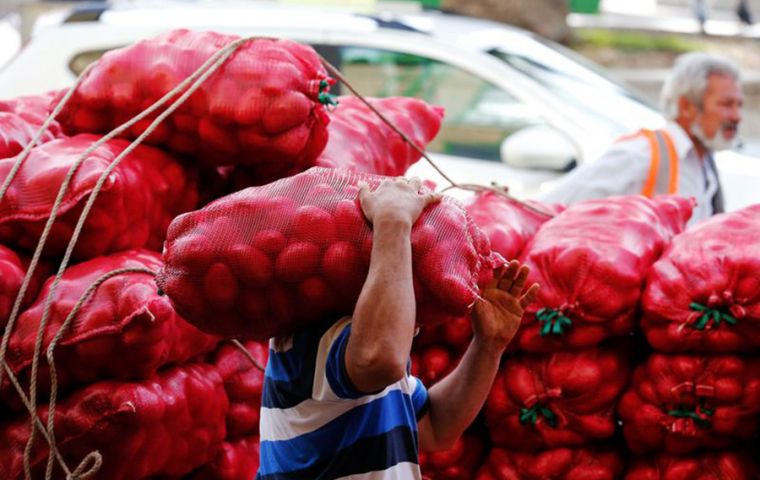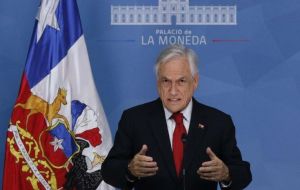MercoPress. South Atlantic News Agency
Lower electricity and transport fares help to keep inflation almost unchanged in turbulent Chile
 Consumer prices in November rose just 0.1%, according to national statistics agency INE. Annual inflation hit 2.7%, creeping to the central bank’s 3% target.
Consumer prices in November rose just 0.1%, according to national statistics agency INE. Annual inflation hit 2.7%, creeping to the central bank’s 3% target.  The most violent, widespread protests to hit Chile since its return to democracy in 1990 has hammered both economic growth and the local currency.
The most violent, widespread protests to hit Chile since its return to democracy in 1990 has hammered both economic growth and the local currency.  Center-right President Sebastian Piñera has proposed a raft of stimulus measures and social reforms to quell protesters demands and boost the economy
Center-right President Sebastian Piñera has proposed a raft of stimulus measures and social reforms to quell protesters demands and boost the economy Chilean consumer prices barely budged amid unrest in November, the government said on Friday, with inflationary pressure from a downward spiraling peso offset by one-time cuts in electricity rates and public transportation fares.
Consumer prices in November rose just 0.1%, according to national statistics agency INE. Annual inflation hit 2.7%, creeping to the central bank’s 3% target.
The most violent, widespread protests to hit Chile since its return to democracy in 1990 have left at least 26 dead through November. The unrest has hammered both economic growth and the local currency.
Center-right President Sebastian Piñera has proposed a raft of stimulus measures and social reforms to quell protesters demands and boost the economy. Piñera early on announced measures to revert previously announced hikes in electricity rates and metro fares.
INE did not mention the ongoing protests in a statement accompanying the data release. But the agency did say a drop in the price of basic services, electricity and housing costs had counterbalanced a rise in many consumer goods, from food and beverages to recreational and cultural activities.
Mauricio Carrasco, an analyst with Chilean consultancy Econsult, said prices of consumer goods would likely rise in the short term if the peso continues to flounder.
“In the coming months ... tradable goods will continue to see upwards inflationary pressure in the short term, considering the shock from the depreciation of the peso,” Carrasco said.
In the medium term, the rise in prices would stagnate as a slumping economy contributes to slower growth in wages and lower demand for goods and services, Carrasco said.
The central bank this week decided against slashing its benchmark interest rate, saying it would instead watch the impacts on inflation of a US$ 5.5 billion fiscal stimulus plan and the depreciating peso. Both are expected to help push long-lagging consumer prices upwards in coming months, the bank said.
The bank expects inflation to hit 3.4% in 2019, and 3.6% in 2020.




Top Comments
Disclaimer & comment rulesCommenting for this story is now closed.
If you have a Facebook account, become a fan and comment on our Facebook Page!